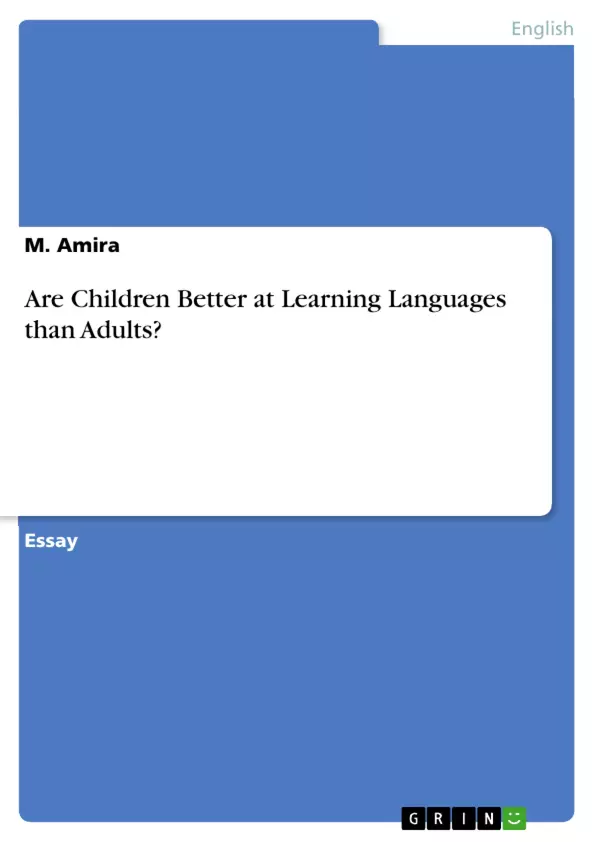The assumption that children are better at learning languages than adults is neither new nor resolved and provides a constant space for debate in the field of linguistic research. The role of age in language acquisition is a contested and complex topic and the question whether children are better language learners provides a broad basis for discussion and reflects general beliefs that persist concerning language learning. However, this question is too general and must be narrowed down in order to stay within the realm of a realistic focus and to develop a reasonable argument. Therefore, I will investigate this question on the basis of age effects with a particular focus on second language acquisition.
This essay discusses positions coming in for and against the assertion that children are better language learner than adults. In order to access the problematic of this question, we are going to take a look at common beliefs on age effects in second language acquisition. In the following analyses, the common “the younger, the better” belief is discussed, in combination with related SLA myths. In this context, the role of internal and external factors on SLA and in what way they impact bilingual outcome is taken into consideration. On the basis of this knowledge, particular differences in language acquisition for younger and older learners emerge, which demonstrate the complexity and range of language development. Next, we will approach various perspectives on the notion of the involvement of a biological variable that determines or influences language proficiency and whether this variable creates a biological advantage for children in language acquisition.
Inhaltsverzeichnis (Table of Contents)
- Introduction
- Age Effects in SLA
- Common SLA Myths
- Internal and external factors on SLA
- Differences in SL Achievements between Children and Adults
- Biological Differences between Children and Adults in SLA
- The Critical Period Hypothesis
Zielsetzung und Themenschwerpunkte (Objectives and Key Themes)
The essay aims to examine the validity of the common belief that children are better at learning languages than adults. It specifically focuses on second language acquisition (SLA), discussing age effects and exploring the complex interplay of internal and external factors influencing language learning outcomes.
- The role of age in second language acquisition.
- The influence of internal and external factors on language learning success.
- The impact of biological variables and brain plasticity on language acquisition.
- The validity of the Critical Period Hypothesis and its implications for language learning.
- The comparison of long-term and short-term language learning achievements between children and adults.
Zusammenfassung der Kapitel (Chapter Summaries)
The introduction sets the stage for the discussion by exploring the contested nature of the question of whether children are better language learners than adults. It narrows the scope to focus on second language acquisition and outlines the essay's structure, which includes examining common beliefs about age effects, internal and external factors influencing SLA, biological differences, and the critical period hypothesis.
The chapter on "Age Effects in SLA" delves into common myths surrounding the role of age in language learning, including the belief that younger learners are superior to older learners. This section examines the influence of internal and external factors, highlighting the importance of social-psychological factors such as motivation and concentration. It analyzes research findings that question the assumption of a significant difference in language learning outcomes between children and adults.
The chapter on "Biological Differences between Children and Adults in SLA" explores theories such as brain plasticity and biological predisposition, which argue for a biological advantage in language acquisition for children. It examines evidence supporting and challenging these theories, including research on brain development and the potential for compensatory mechanisms in adults.
Schlüsselwörter (Keywords)
The key keywords and focus topics of this work encompass second language acquisition (SLA), age effects, internal and external factors, biological differences, brain plasticity, critical period hypothesis, pronunciation fidelity, morphosyntax, long-term and short-term achievements, and native-like fluency.
Frequently Asked Questions
Is it true that children learn second languages more easily than adults?
This is a contested topic in linguistics. While there is a common "the younger, the better" belief, research shows that the reality is complex, involving both biological advantages for children and compensatory learning mechanisms for adults.
What is the Critical Period Hypothesis (CPH)?
The CPH suggests that there is a specific biological window in early life during which language acquisition is most successful. After this period, reaching native-like fluency is thought to become more difficult.
How does brain plasticity affect language learning?
Brain plasticity refers to the brain's ability to reorganize itself. Children generally have higher plasticity, which may aid in acquiring native-like pronunciation and grammar naturally.
What internal and external factors influence Second Language Acquisition (SLA)?
Success in learning a language depends on internal factors like motivation and concentration, as well as external factors like the social environment and the quality of instruction.
Do adults have any advantages in language learning?
Yes, adults often have better cognitive skills, more developed learning strategies, and a greater capacity for abstract thought, which can help them learn certain aspects of a language faster than children in the short term.
- Citation du texte
- M. Amira (Auteur), 2021, Are Children Better at Learning Languages than Adults?, Munich, GRIN Verlag, https://www.grin.com/document/1330364



